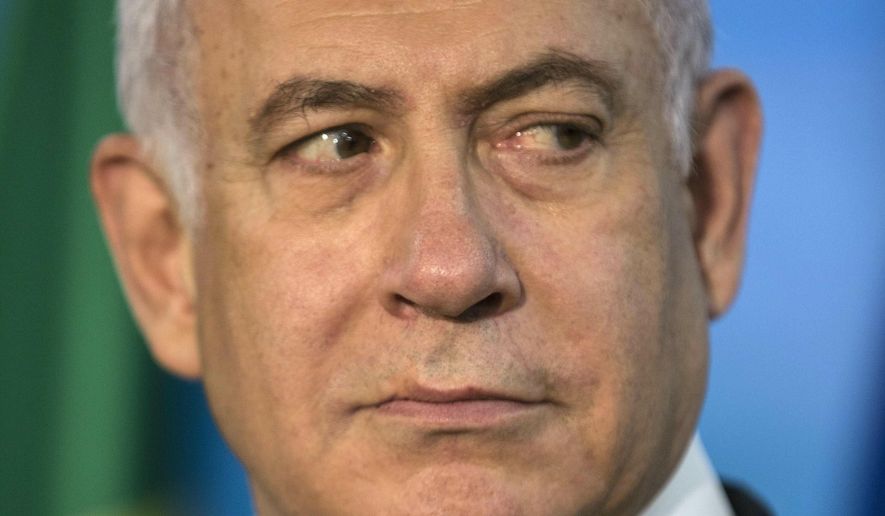JERUSALEM — Long-serving Prime Minister Benjamin Netanyahu vowed to fight an indictment for bribery, fraud and breach of trust in three different cases that have been hanging over the leader’s head for more than a year in the midst of an unprecedented political stalemate for Israel.
In a late-night speech here Thursday after the indictments were announced, the hawkish Likud leader accused his enemies of plotting a to overturn his right-wing government and said the investigation against him should be under the spotlight. The indictment decision, which had kept the country in limbo through two inconclusive elections this year, was announced a day after Mr. Netanyahu’s main rival, Blue and White party chief Benny Gantz, said he could not form a governing coalition.
Mr. Netanyahu, who has cultivated close ties with President Trump, has dominated the political scene for a decade, but the formal corruption charges represent the greatest threat to date to his hold on power. An October poll by the Israel Democracy Institute, a nonpartisan think tank, found that 65% of Israelis thought Mr. Netanyahu should resign as head of Likud if indicted, with 24% opposed.
A strained-looking Mr. Netanyahu claimed once again Thursday that he was the victim of a giant conspiracy by police and prosecutors to bring him down, condemning what he called an “attempted coup” by the politically motivated prosecutors.
“Police and investigators are not above the law,” he said. “The time has come to investigate the investigators.”
Several dozen supporters and opponents of the prime minister staged rival demonstrations outside the prime minister’s official residence Thursday night, according to news reports. Police kept the groups apart and there were no reports of violence.
Attorney General Avichai Mandelblit charged Mr. Netanyahu with bribery in a case involved alleged favoritism toward a telecommunications company, and with breach of trust and fraud in two separate cases involving the receipt of illegal gifts in exchange for positive media coverage. Mr. Netanyahu is Israel’s first prime minister to be indicted in office, however the indictments have been widely expected since March when Mr. Mandelblit expressed an intention to indict.
“A day in which the attorney general decides to serve an indictment against a seated prime minister for serious crimes of corrupt governance is a heavy and sad day, for the Israeli public and for me personally,” Mr. Mandelblit, who was appointed by Mr. Netanyahu, told reporters, according to the Associated Press.
Year of turmoil
The indictment comes as Israel has faced a year of political turmoil and as it confronts growing Iranian threats and rocket fire from the Gaza Strip. On November 12, Israel struck a senior Palestinian Islamic Jihad figure and just this week launched multiple strikes on suspected Iranian assets in Syria.
The indictments inject yet another major note of uncertainty into Israel’s political system. Mr. Netanyahu and Mr. Gantz, with virtually equal representation in the Knesset, have both failed to attract enough smaller-party support to form a government in recent weeks. Mr. Netanyahu’s own participation in any unity government, particularly with the legal troubles hanging over him, was a major complication in the talks.
Mr. Netanyahu’s Likud party now faces a difficult choice as its leader for ten years decides his future. Mr. Gantz has ruled out a coalition with the prime minister, arguing that a leader “up to his neck in corruption allegations has no public or moral mandate to make fateful decisions for the State of Israel.” He said no party leader is above the nation and that Mr. Netanyahu should remember the country is still a democracy.
Avigdor Lieberman, leader of a smaller party that has refused to sit with religious parties in the next Knesset, said he hoped Mr. Netanyahu was acquitted of the cases.
Mr. Netanyahu insists he is innocent of the charges, saying he has only worked on behalf of the country. He has accused the left and the investigators of trying to overturn his “right-wing” government, and predicts he will be exonerated eventually.
But his long political career means Mr. Netanyahu has built up a deep reservoir of fervent backers, and an equally deep well of political enemies.
Ayman Odeh, leader of the Joint list which includes Arab parties and the far-left Hadash, said that the indictment will help to put an end to the “racism and hatred that Netanyahu propagated.”
Yair Lapid, one of the leaders of the Blue and White party, said that it was time for Mr. Netanyahu to resign.
“Until recent years Netanyahu devoted most of his life to strengthening the state of Israel. If he still cares he has one more thing to do: resign.”
But Mr. Netanyahu’s assistants were tweeting even as he addressed the nation, arguing on social media that “it is time to investigate the prosecutor’s office.”
For his part, Mr. Mandelblit denied any political bias and said he had acted solely out of professional considerations.
“This is not a matter of politics,” he said, according to the Associated Press. “This is an obligation placed on us, the people of law enforcement, and upon me personally as the one at its head.”
• This article was based in part on wire service reports.
• Seth J. Frantzman can be reached at srantzman@washingtontimes.com.




Please read our comment policy before commenting.